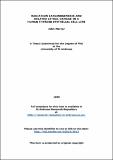Radiation carcinogenesis and delayed lethal damage in a human thyroid epithelial cell line
Abstract
The human thyroid epithelial cell HTori-3 has been transformed with doses of either
chronic and acute x-rays or strontium beta particles. Models of the past have relied
upon animal cell systems to mimic in vitro carcinogenesis. The HTori-3 system
hoped to overcome the limitations associated with these types of models by using a
human thyroid cell line immortalised with the SV40 virus.
HTori-3 human thyroid epithelial cells were irradiated in vitro, passaged and then
transplanted into nude mice. Tumours that grew over a 2-6 month period were
excised and re-established in culture. Samples were stored and all tumours were
taken for histological examination. Chromosome spreads confirmed the human
nature of all tumours.
Following exposure to acute x-rays in the range of 0.25-2.0 Gy 13 tumours were
observed in 25 recipients. Following 0.25-2.0 Gy of chronic x-rays 10 tumours from
25 recipients were observed. From a single 2 Gy exposure of strontium beta
particles 3 primary tumours from 5 recipients were observed. The largest of these
was re-transplanted in nude mice resulting in 100% incidence. All tumours were
classified as undifferentiated anaplastic carcinomas. A small number of tumours
were observed in the control cell lines, these may be the result of a general
instability found with the partial transformed parental cell line.
All 2Gy tumours and those previously established from this laboratory after alpha or
gamma radiation were used to test for the presence of the delayed lethal death
phenotype. A number of cell and molecular endpoints were used. These included
plating efficiency, cell adherence, micronucleus formation and p53 status. In all
incidences, the reproductive viability of irradiated cells was below that of non-
irradiated cells at up to 4 weeks post-irradiation.
The HTori-3 cell line and the techniques used to study the delayed effects of
radiation may be applicable to other cell systems and may be a useful model to study
the long-term effects of radiation induced genomic instability.
Type
Thesis, PhD Doctor of Philosophy
Collections
Items in the St Andrews Research Repository are protected by copyright, with all rights reserved, unless otherwise indicated.

